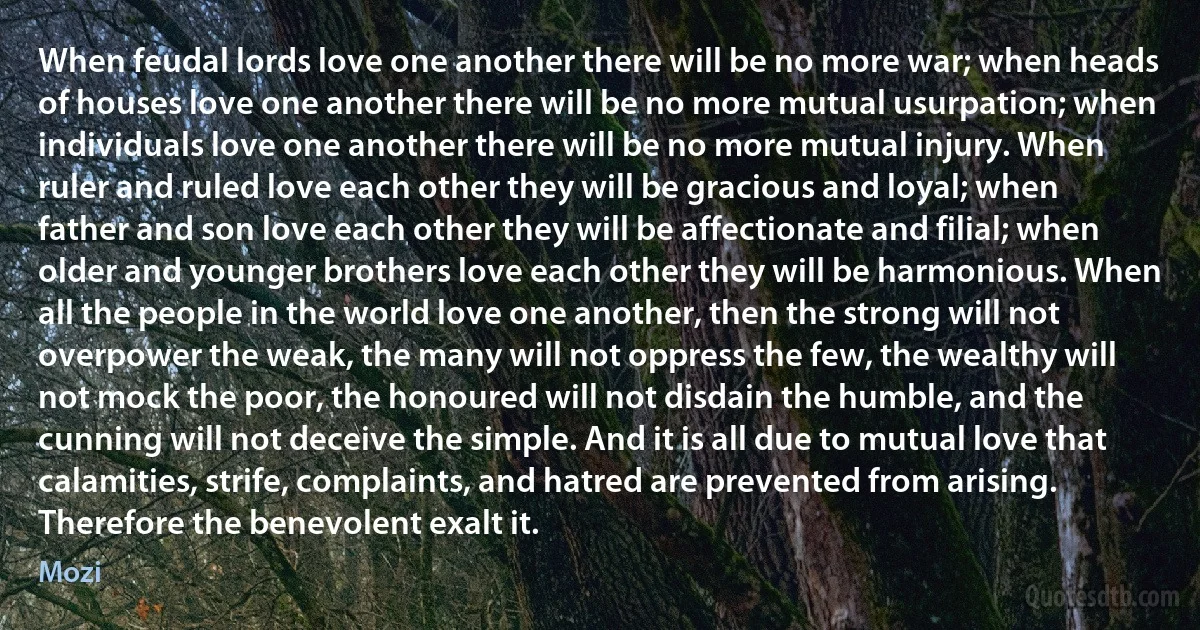
When feudal lords love one another there will be no more war; when heads of houses love one another there will be no more mutual usurpation; when individuals love one another there will be no more mutual injury. When ruler and ruled love each other they will be gracious and loyal; when father and son love each other they will be affectionate and filial; when older and younger brothers love each other they will be harmonious. When all the people in the world love one another, then the strong will not overpower the weak, the many will not oppress the few, the wealthy will not mock the poor, the honoured will not disdain the humble, and the cunning will not deceive the simple. And it is all due to mutual love that calamities, strife, complaints, and hatred are prevented from arising. Therefore the benevolent exalt it.
MoziRelated topics
cunning disdain due father few hatred humble injury love people poor simple son strife usurpation war wealthy world younger heads lordsRelated quotes
The Eternal has his designs from all eternity. If prayer is in accord with his immutable wishes, it is quite useless to ask of him what he has resolved to do. If one prays to him to do the contrary of what he has resolved, it is praying that he be weak, frivolous, inconstant; it is believing that he is thus, it is to mock him. Either you ask him a just thing, in which case he must do it, the thing being done without your praying to him for it, and so to entreat him is then to distrust him; or the thing is unjust, and then you insult him. You are worthy or unworthy of the grace you implore: if worthy, he knows it better than you; if unworthy, you commit another crime by requesting what is undeserved.
In a word, we only pray to God because we have made him in our image. We treat him like a pasha, like a sultan whom one may provoke or appease.

Voltaire
We have heard from the opposite Bench several very animated appeals to this House, and several constitutional lectures as to our duties. The noble Earl the late Foreign Secretary (the Earl of Clarendon) went so far, as I understood him, as to tell us that we must watch public opinion more closely, and pay greater attention to the majorities in the other House of Parliament. My Lords, it occurs to me to ask the noble Earl whether he has considered for what purpose this House exists, and whether he would be willing to go through the humiliation of being a mere echo and supple tool of the other House in order to secure for himself the luxury of mock legislation? I agree with my noble Friend the noble Earl (the Earl of Derby) below me that it were better not to be than submit to such a slavery.

Robert Gascoyne-Cecil, 3rd Marquess of Salisbury
No one ever landed on English soil with more hatred in his heart for a race than I did for the English, and, on this platform, are present English friends who can bear witness to the fact, but the more I lived among them, saw how the machine is working, the English national life, mixed with them, found where the heart-beat of the nation was, the more I loved them. There is none among you here present, my brothers, who loves the English people more than I do. You have to see what is going on there, and you have to mix with them. As the philosophy, our national philosophy of the Vedanta, has summarised all misfortune, all misery from that one cause, ignorance, herein also we must understand that the difficulties that arise between us and the English people are mostly due to that ignorance; we do not know them, they do not know us.

Swami Vivekananda
In ressentiment morality, love for the "small,” the "poor,” the "weak,” and the "oppressed” is really disguised hatred, repressed envy, an impulse to detract, etc., directed against the opposite phenomena: "wealth,” "strength,” "power,” "largesse.” When hatred does not dare to come out into the open, it can be easily expressed in the form of ostensible love-love for something which has features that are the opposite of those of the hated object. This can happen in such a way that the hatred remains secret. When we hear that falsely pious, unctuous tone (it is the tone of a certain "socially-minded” type of priest), sermonizing that love for the "small” is our first duty, love for the "humble” inspirit, since God gives "grace” to them, then it is often only hatred posing as Christian love.

Max Scheler
The question "cui bono" to what practical end and advantage do your researches tend? is one which the speculative philosopher who loves knowledge for its own sake, and enjoys, as a rational being should enjoy, the mere contemplation of harmonious and mutually dependent truths, can seldom hear without a sense of humiliation. He feels that there is a lofty and disinterested pleasure in his speculations which ought to exempt them from such questioning; communicating as they do to his own mind the purest happiness (after the exercise of the benevolent and moral feelings) of which human nature is susceptible, and tending to the injury of no one, he might surely allege this as a sufficient and direct reply to those who, having themselves little capacity, and less relish for intellectual pursuits, are constantly repeating upon him this enquiry.

John Herschel
